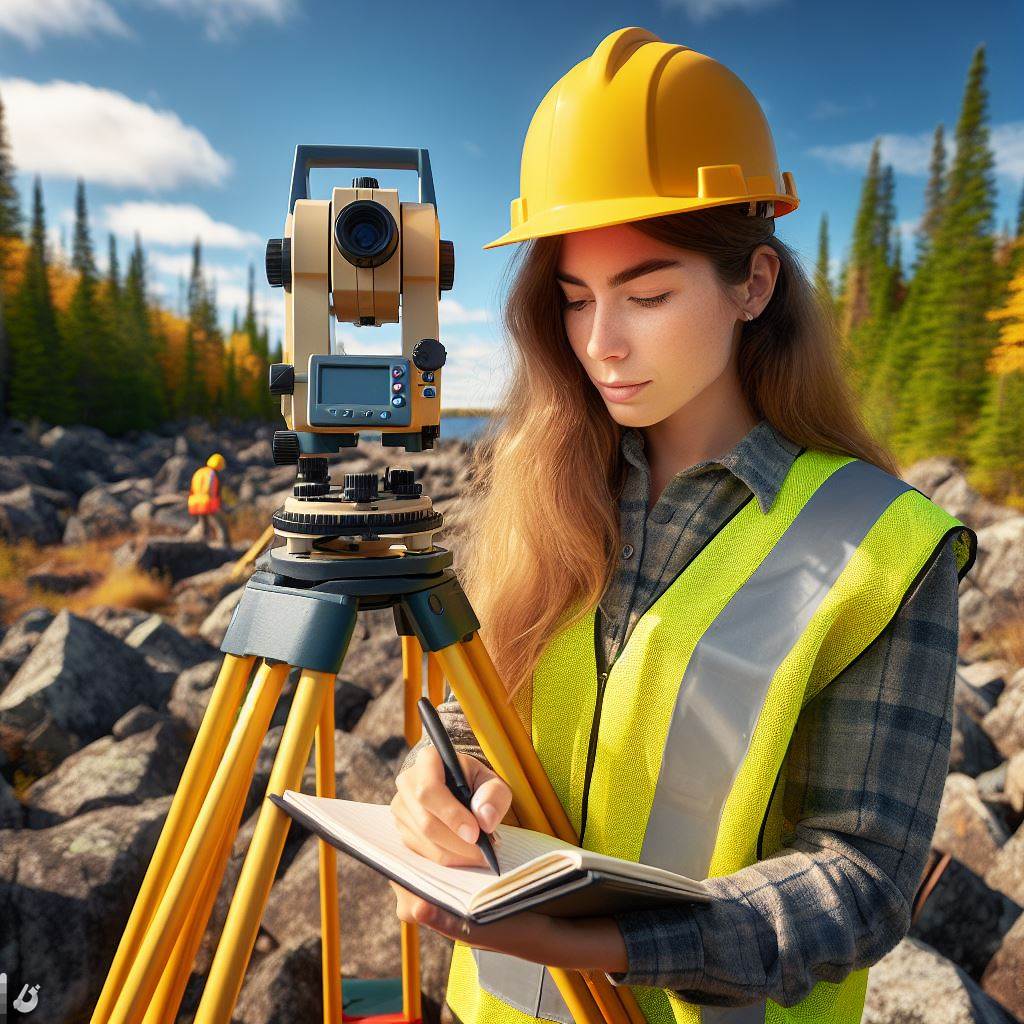Introduction
In the vast and diverse landscape of Canada, the distinction between rural and urban surveying plays a crucial role.
Understanding this distinction is of utmost importance for various reasons. How can we accurately assess the needs and challenges of each region?
Imagine a scenario where a surveyor is tasked with assessing land for a new infrastructure project.
Would the approach and considerations differ in a rural area compared to an urban center?
The unique characteristics of each setting necessitate different methods and perspectives.
By delving into the world of rural and urban surveying, we uncover the unique insights necessary to navigate the Canadian landscape efficiently and effectively.
This distinction allows us to comprehend the specific requirements of both rural and urban areas.
Why is it so important to understand this distinction?
At a basic level, it facilitates proper planning and management of land and infrastructure development.
Without this understanding, crucial factors could be overlooked, leading to inefficient use of resources and potential harm to the environment.
Furthermore, this understanding allows for targeted economic development, as different regions require different strategies.
By focusing on rural areas, for example, we can spur growth and alleviate regional disparities.
In the following sections, we will explore the nuances of rural and urban surveying in Canada, dissecting the challenges, differences, and importance of each aspect.
Join us on this exploration of understanding and uncovering the true essence of the Canadian landscape.
Definition and Overview
Define rural and urban surveying
- Rural surveying refers to the practice of conducting land surveys in rural areas.
- Urban surveying, on the other hand, involves conducting land surveys in urban or city areas.
Rural surveying primarily focuses on measuring and mapping vast stretches of land in rural and remote areas.
It involves working with large tracts of agricultural, forested, or undeveloped land.
In contrast, urban surveying involves dealing with smaller plots of land in densely populated areas.
Differences in Location, Scope, and Challenges
- Location: Rural surveying takes place in sparsely populated areas, often far from urban centers. Urban surveying occurs in densely populated cities.
- Scope: Rural surveying primarily deals with large land parcels, such as agricultural or forestry lands. Urban surveying focuses on smaller plots, including residential, commercial, and industrial areas.
- Challenges: Rural surveying faces challenges due to the vastness and remoteness of the land, making access and transportation difficult. Urban surveying faces challenges related to dense buildings, underground infrastructure, and limited space for survey equipment.
Significance in Various Sectors and Industries
Both rural and urban surveying play crucial roles in several sectors and industries, including:
- Real Estate: Urban surveying is essential for determining property boundaries, assessing land value, and preparing subdivisions for residential or commercial developments. Rural surveying helps in evaluating large parcels of land for agricultural or forestry purposes.
- Infrastructure Development: Urban surveying assists in planning and constructing roads, bridges, and utilities. Rural surveying is critical for building infrastructure projects like dams, power plants, and irrigation systems.
- Environmental Management: Rural surveying aids in mapping natural resources, managing forests, and preserving ecological areas. Urban surveying is needed for assessing the impact of development projects on the environment.
- Transportation Planning: Urban surveying contributes to designing efficient transportation systems and optimizing traffic flow within cities. Rural surveying helps in planning and developing transportation corridors in remote areas.
- Government and Public Services: Both types of surveying are essential for land administration, property taxation, and urban planning. Rural surveying supports land zoning and resource management in rural communities.
- Disaster Management: Urban surveying helps in assessing and mitigating risks related to natural disasters. Rural surveying aids in mapping areas prone to floods, landslides, or wildfires.
In fact, rural and urban surveying differ in terms of location, scope, and challenges.
Rural surveying pertains to conducting land surveys in remote areas with large tracts of land, while urban surveying focuses on smaller plots in densely populated cities.
Both types play significant roles in various sectors and industries, contributing to economic development, infrastructure planning, environmental management, and public services.
Read: Canadian Surveyors: Their Role in Urban Planning
The Role of Rural Surveying in Canada
Rural surveying plays a significant role in Canada’s resource-based industries, such as forestry, mining, and agriculture.
It is crucial for ensuring the sustainable development and efficient management of these industries.
Let’s delve into the importance, responsibilities, and challenges faced by rural surveyors, along with examples of projects where rural surveying plays a crucial role.
Unlock Your Career Potential
Visualize a clear path to success with our tailored Career Consulting service. Personalized insights in just 1-3 days.
Get StartedImportance of Rural Surveying
- Rural surveying is vital in Canada’s resource-based industries as it enables the identification and utilization of natural resources.
- Accurate mapping and measurement of rural areas assist in effective land management for sustainable forestry practices.
- Rural surveying ensures precise delineation of mining boundaries, reducing conflicts and maximizing resource extraction.
- It helps in determining suitable locations for agricultural activities, optimizing crop yields, and ensuring food security
Responsibilities and Challenges Faced by Rural Surveyors
- Rural surveyors are responsible for conducting field surveys to collect data on land boundaries, topography, and natural resources.
- They must accurately analyze collected data, create detailed maps, and provide essential information for planning and decision-making.
- Challenges faced by rural surveyors include working in remote and challenging terrains, harsh weather conditions, and limited accessibility.
- They also encounter situations where precise measurements need to be taken in densely vegetated areas or uneven landscapes.
Crucial Role of Rural Surveying
Rural surveying plays a crucial role in various projects and industries, some of which include:
Forestry
Rural surveying assists in sustainable forest management by:
- Mapping forest boundaries and identifying areas suitable for timber harvesting.
- Assessing forest qualities, growth rates, and timber volumes for optimal resource allocation.
- Developing forest management plans, considering ecological factors and biodiversity.
Mining
Rural surveying contributes to efficient mining operations by:
- Accurately determining mining leases and concessions to prevent overlap and conflicts.
- Conducting detailed surveys to identify mineral deposits and estimate their quantities.
- Monitoring environmental impacts and ensuring compliance with regulatory requirements.
Agriculture
Rural surveying aids in agricultural activities for increased productivity and sustainable practices:
- Delineating agricultural lands for irrigation planning, preventing water wastage.
- Mapping soil types and fertility to optimize crop selection and fertilizer usage.
- Assessing drainage patterns and designing drainage systems for improved land productivity.
In short, rural surveying holds great importance in Canada’s resource-based industries.
It enables the effective management of natural resources, sustainable development, and optimized utilization.
Rural surveyors face various responsibilities and challenges, but their expertise contributes greatly to projects in forestry, mining, and agriculture.
Through their work, they help in the growth and sustainability of Canada’s rural areas.
Read: Salary Trends for Surveyors in Canada (2024 Update)
The Role of Urban Surveying in Canada
Urban surveying plays a crucial role in the development and maintenance of Canada’s urban areas.
This branch of surveying focuses on the measurement, mapping, and analysis of land within cities and towns, contributing to the efficient and sustainable growth of urban communities and their infrastructure projects.
Significance of Urban Surveying
Urban surveying is essential for Canada’s urban development as it provides accurate data and information about the land, properties, and structures within urban areas.
This knowledge is crucial for effective urban planning, zoning, and infrastructure development.
By conducting precise measurements and creating detailed maps, urban surveyors assist city planners and architects in determining the optimal locations for new buildings, roads, and utilities.
This ensures that urban development projects are implemented in a way that maximizes efficiency, minimizes environmental impact, and enhances the quality of life for urban residents.
Responsibilities and Challenges of Urban Surveyors
Urban surveyors have a range of responsibilities and face unique challenges in their field.
They are responsible for conducting precise measurements, taking into account the complexities of urban environments such as existing structures, underground utilities, and varying terrain.
These professionals employ advanced surveying tools and technologies, such as GPS, drones, and laser scanners, to accurately collect data.
They then analyze this information to produce detailed maps and reports that can be used for various purposes, including land development, property assessment, and legal documentation.
One of the challenges faced by urban surveyors is the limited space available in urban areas.
They often need to work in densely populated areas where access to certain locations may be restricted.
This requires creativity and resourcefulness in finding alternative methods and approaches to collect data effectively.
High-demand Industries and Projects
Urban surveying is in high demand across various industries and projects in Canada.
One such industry is real estate development, where accurate property surveys are essential for determining boundaries, assessing property values, and resolving disputes.
The construction industry also heavily relies on urban surveying for infrastructure development, including the construction of roads, bridges, and buildings.
Surveyors play a vital role in ensuring the correct positioning and alignment of these structures, contributing to their stability and functionality.
Additionally, urban surveying is crucial in the field of urban renewal and revitalization projects.
By accurately mapping existing infrastructure and analyzing land use patterns, surveyors help identify areas that require redevelopment, helping to create sustainable and vibrant urban spaces.
In essence, urban surveying is of significant importance in Canada’s urban development and infrastructure projects.
The responsibilities of urban surveyors include precise measurements, mapping, and analysis of land, while facing challenges unique to urban environments.
The demand for urban surveying is high in industries such as real estate, construction, and urban renewal, where accurate data is crucial for successful development and growth.
Read: Top Canadian Universities for Aspiring Surveyors

Career Prospects and Opportunities
In Canada, rural and urban surveyors have distinct career prospects and opportunities.
While both sectors offer opportunities for growth, demand varies between the two.
Comparing Career Prospects
Rural surveyors in Canada may find fewer job opportunities compared to their urban counterparts.
This is primarily due to the higher concentration of development and construction projects in urban areas.
On the other hand, urban surveyors have a wider range of projects to work on, including large-scale infrastructure developments, land use planning, and property assessments.
Contrasting Opportunities
While rural surveyors might face limited career options, there are advantages to pursuing a career in a smaller community.
Rural areas often offer a closer-knit community, bonding with clients, and diverse project scopes that include agricultural and natural resource management.
Urban surveyors, with access to more diverse projects, have the opportunity to specialize in specific areas such as high-rise buildings, transportation infrastructure, or commercial real estate.
There may also be more opportunities for career advancement and higher salaries in urban areas.
Growth Potential and Demand
Both rural and urban surveyors can expect growth in their respective sectors, but the demand may differ.
Rural areas in Canada are experiencing a slower population growth rate, which can impact demand for surveying work.
However, the need for rural surveyors remains constant for projects related to land conservation, recreational planning, and farming.
Urban areas, on the other hand, have a higher population density and ongoing development projects.
This creates a continuous demand for urban surveyors to ensure infrastructure development, zoning compliance, and land-use planning.
Factors to Consider
When choosing a career path in surveying, several factors should be taken into account.
Personal preferences play a crucial role. Some individuals may prefer the quiet serenity of rural settings, while others thrive in the fast-paced environment of urban areas.
Lifestyle is an important consideration as well. Rural surveyors may enjoy a slower pace of life, while urban surveyors may have access to a wider range of amenities and cultural opportunities.
Job stability is another factor to consider. While urban areas may offer more job opportunities, rural areas often have fewer competitors, allowing for more stable employment prospects.
In general, rural and urban surveyors in Canada have distinct career prospects and opportunities.
While urban surveyors may have more diverse projects and potentially higher salaries, rural surveyors often enjoy closer connections with the community.
Factors such as personal preferences, lifestyle, and job stability should be considered when choosing a career path in surveying.
Read: Surveying Laws in Canada: What You Need to Know
You Might Also Like: Canadian Electrical Projects Making Waves
See Related Content: Canadian Electrical Engineer: Licenses & Certs
Challenges and Advantages
Unique Challenges Faced by Rural and Urban Surveyors
- Access to remote areas poses a significant challenge for rural surveyors, as these areas are often geographically isolated.
- Rural surveyors must travel long distances and navigate difficult terrains to reach their survey sites.
- Dealing with crowded urban environments is a prominent challenge faced by urban surveyors due to the population density.
- Urban surveyors need to handle the complexities of working in densely populated areas, including traffic and noise disturbances.
Advantages of Working in Each Setting
Job Variety
- Rural surveyors enjoy a diverse range of projects, including land boundaries and resource management.
- Urban surveyors have the advantage of working on projects related to urban planning, infrastructure development, and construction.
Work-Life Balance
- Rural surveyors often experience a better work-life balance due to less time spent commuting and lower stress levels.
- Urban surveyors may face longer working hours and higher stress levels due to the fast-paced nature of urban environments.
Potential for Specialization
- Rural surveyors have the opportunity to specialize in areas such as forestry, agriculture, or environmental surveying.
- Urban surveyors can specialize in areas like building information modeling, 3D scanning, or smart city technology.
Technology and Resources
- Rural surveyors may face challenges in accessing advanced surveying technology and resources due to remote locations.
- Urban surveyors have better access to state-of-the-art surveying equipment and technologies, making their work more efficient.
Clientele Diversity
- Rural surveyors often work with a smaller pool of clients, allowing them to build stronger relationships and understand local needs.
- Urban surveyors have a diverse range of clients, including government agencies, private developers, and corporations, offering varied perspectives.
Community Impact
- Rural surveyors play a crucial role in land management and conservation, contributing to the sustainable development of rural areas.
- Urban surveyors help shape and transform urban landscapes, improving infrastructure and enhancing quality of life for residents.
In a nutshell, rural and urban surveying in Canada present unique challenges and advantages to professionals in the field.
While rural surveyors face obstacles related to accessing remote areas, urban surveyors encounter the complexities of working in crowded urban environments.
The advantages of working in each setting vary, including job variety, work-life balance, potential for specialization, access to technology and resources, clientele diversity, and community impact.
Choosing between rural and urban surveying ultimately depends on individual preferences, interests, and career goals.
Conclusion
It is vital to understand the differences between rural and urban surveying in the Canadian context.
Rural surveying offers opportunities for working in remote and picturesque locations, while urban surveying provides exposure to large-scale construction projects.
Both paths have their own unique challenges and rewards.
By understanding these differences, aspiring surveyors can make informed decisions about their career paths and choose what suits their interests and goals best.
It is crucial to consider factors such as work environment, lifestyle, and project types before committing to a specific path.
To gain a deeper understanding, readers are encouraged to explore further resources and seek more information on surveying in Canada.
This can include researching educational programs, speaking with professionals in the field, and attending industry events or seminars.
The field of surveying offers a diverse range of opportunities, and it is essential to choose the path that aligns with one’s passions and aspirations.
Whether it’s the solitude and natural beauty of rural surveying or the fast-paced and dynamic nature of urban surveying, finding the right fit is key to a fulfilling career in this industry.
Remember, as the landscape of Canada continues to evolve, so too will the demand for skilled surveyors.
Embrace the opportunities and challenges that come with this profession, and carve out a path that will lead to a successful and rewarding career in surveying in Canada.




